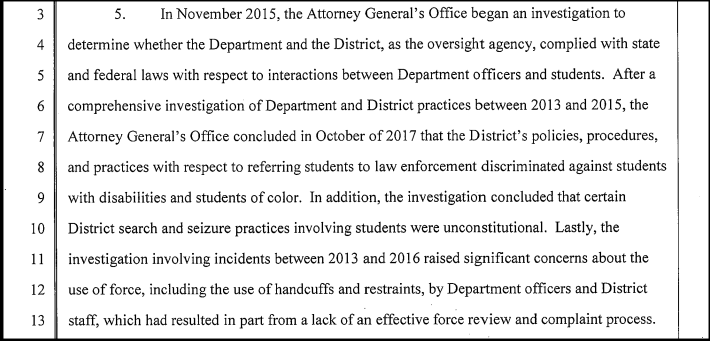The Stockton Unified School District and its police department have agreed to five years of state monitoring after a California Department of Justice investigation uncovered “systemwide” discriminatory treatment of students of color and those with disabilities.
Looking at the school years between 2013 and 2016, the DOJ found that Stockton schools were referring disproportionate numbers of black, Latino, and disabled kids, as well as young children, to the school police.
School administrators brought law enforcement in often, even to deal with kids in trouble for minor issues, like disrupting class, and for behavior resulting from a student’s disability.
Yet problems with data tracking at the Stockton district and school police department meant that the referral records often held few details about the incidents.
Despite the data’s limitations, the DOJ was able to dig out some alarming statistics. For example, the odds that incidents involving black students under 10 would be referred to school police were 177 percent higher than for their white peers.
Among kids over 10, the odds that a black student’s conduct would lead to arrest were 148 percent greater than other Stockton students. Latino students’ arrest odds were 124 percent higher than other kids. School police were also more likely to give citations to black and Latino children.
And the responses to the conduct of kids over 10 were more severe for black and Latino students than white kids, even when controlling for the severity of the infraction.
A separate ACLU investigation into Stockton students’ treatment between 2013 and 2017 revealed that 41 percent of arrests and citations were for low-level infractions. Black students were three times more likely to be arrested or cited for “disturbing the peace,” which, along with “defiance,” is a vague infraction that can encompass a wide range of–generally non-serious–conduct.
The DOJ complaint against Stockton also noted that low-level infractions “sometimes escalated into more severe consequences for the student, including use of force by a school official or by a school resource officer, including handcuffing and physical restraint techniques, and arrests.”
The DOJ found that, in addition to straight-up over-criminalizing students, the school district also facilitated rights-violating searches, in which police dogs randomly brought to schools sniffed kids’ backpacks. When the dogs alerted on backpacks, the department would search the bag. In one school, administrators went so far as to facilitate random pat-down searches of students’ bodies.
The school and its police have already made some progress toward improving the treatment of kids, in part, by working to launch restorative justice programs, but there is much more to do, according to the California DOJ.
“One of the most critical tasks of the California Department of Justice is to protect the rights of our children to be free from mistreatment, especially in our schools,” said Attorney General Becerra. “Today’s agreement will require the Stockton school district to take important steps to address and remedy civil rights violations committed against African American and Latino students in the administration of discipline. Our children, especially those with a disability, have a right to know that they will be treated equally in school and not unfairly diverted into the criminal justice system.”
Within 180 days of the start of the agreement with the state Justice Dept., Stockton Unified must amend its school discipline policy to ensure that police officers will “not be involved in disciplinary infractions that are more appropriately the responsibility of school administrators and teachers.”
These infractions include disturbing the peace, and the catch-all term “defiance,” as well as trespassing, loitering, using profanity, non-serious vandalism and theft, possession of tobacco and alcohol, verbal fights, and physical fights with no injuries.
The new policy must make clear the circumstances under which teachers and school administrators can call for police assistance–specifically when there is a “major threat” to safety, or in cases of serious criminal conduct on school grounds.
Additionally, the school district must launch a diversion program in order to reduce the frequency of law enforcement referrals, specifically those that result in citation or arrest. The agreement also requires the district to ensure that its officers get mental health crisis intervention training.
Here’s the full list of requirements in the agreement:
– Clear policies and procedures with respect to how and when school administrators refer students to law enforcement;
– Creation of a formal diversion program to address minor school-based criminal offenses, aimed at minimizing arrest citations and bookings;
– Revision of policies and procedures relating to treatment of students with disabilities in order to prevent discrimination, including the hiring of a trained Disability Coordinator at the police department to ensure compliance with disability discrimination laws;
– Creation of a protocol for school site administrators to refer students who exhibit indicators of mental health needs instead of a referral to the police department, where appropriate;
– Training all officers on crisis intervention to handle calls that relate to students in mental health crisis or exhibiting behavior that may indicate mental health needs;
– Reforming use of force policies, procedures, and practices, including a comprehensive review process;
– Ensuring any searches or seizures conform with constitutional standards;
– Providing extensive training on the constitutional and civil rights of students, disability and special education laws, and elimination of bias;
– Tracking and analysis of all arrests and referrals to law enforcement from schools; and
– Creation of a community advisory committee.

